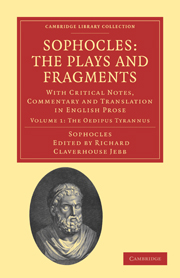INTRODUCTION
Published online by Cambridge University Press: 05 October 2010
Summary
§ 1. TheOedipus Tyrannus is in one sense the masterpiece of Attic Tragedy. No other shows an equal degree of art in the development of the plot; and this excellence depends on the powerful and subtle drawing of the characters. Modern drama, where minor parts can be multiplied and scene changed at will, can more easily divorce the two kinds of merit. Some of Voltaire's plays, for instance, not first-rate in other ways, are models of ingenious construction. The conditions of the Greek stage left less room for such a result. In the Oedipus Tyrannus the highest constructive skill is seen to be intimately and necessarily allied with the vivid delineation of a few persons.
Here it is peculiarly interesting to recover, so far as we can, the form in which the story of Oedipus came to Sophocles; to remark what he has altered or added; and to see how the same subject has been handled by other dramatists.
The essence of the myth is the son slaying his unknown father, and thereby fulfilling a decree of fate. The subsequent marriage, if not an original part of the story, seems to have been an early addition. The central ideas are, (i) the irresistible power of destiny, and (2) the sacredness of the primary natural ties, as measured by the horror of an unconscious sin against it.
- Type
- Chapter
- Information
- Sophocles: The Plays and FragmentsWith Critical Notes, Commentary and Translation in English Prose, pp. xiii - liiPublisher: Cambridge University PressPrint publication year: 2010First published in: 1883



